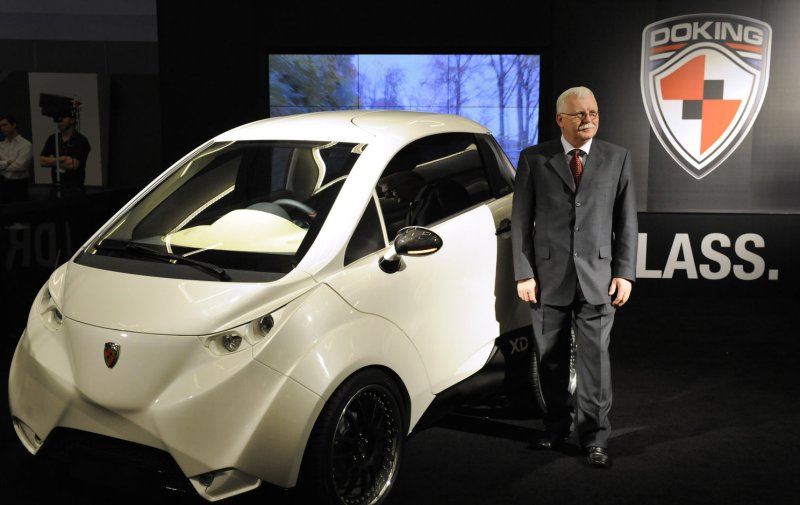1 of 3 | Dok-Ing CEO Vjekoslav Majetic poses with the Croation manufacturers XD electric car on display at the Los Angeles Auto Show held at the convention center in Los Angeles on November 17, 2011. UPI/Phil McCarten |
License Photo
WASHINGTON, Feb. 27 (UPI) -- Advances in longer-lasting lithium-ion batteries will make electric cars more affordable and easier to introduce on a large scale, a new study said.
Envia Systems, which says it achieved world record energy density for lithium-ion batteries at half the price, outlined reasons that make affordable mass-market electric vehicles "dramatically closer to commercialization."
The company says development of its proprietary lithium-ion batteries will slash the prices of 300-mile electric cars.
"Envia has achieved world record energy density for lithium-ion batteries," the company said. The "unprecedented energy density, combined with the use of low-cost materials and manufacturing processes," cuts the cost of a vehicle's battery pack by more than 50 percent.
The battery's performance was verified by the electrochemical power systems department at the Naval Surface Warfare Center, Envia said.
The tests indicated the highest recorded energy density of 400 watt-hours per kilogram for a lithium-ion cell.
Historically, lithium-ion battery energy densities have increased by about 5 percent per year, while Envia says that in the last two years it has nearly tripled the energy density of their battery cell to achieve the record.
Envia received grants from the Advanced Research Projects Agency-Energy and the California Energy Commission in 2010 to develop high energy density batteries for electric vehicles.
General Motors Ventures LLC participated in an equity investment round of $17 million in 2011 and secured the rights to Envia's patented advanced cathode material for future electrically powered vehicles manufactured by GM.
The cathode uses abundant low cost materials such as manganese which lower the overall battery cost while maintaining stability and long life cycles, Envia said.
The company is developing high-performance silicon-carbon composite anode and high-voltage electrolytes with the aim of further optimizing the battery's performance.
The development also the number of cells needed for an electric vehicle may be reduced by about half.
Battery life is one of the key concerns often expressed in the ongoing debate over electric cars. Consumers choosing to switch to electric cars don't want "range anxiety" -- worry over when the battery may run out.
"Envia's achievement addresses both issues head-on," the company said. The technical breakthrough will go some way toward mainstream manufacturing of electric vehicles.
However, consumers will still be looking toward removal of concerns over cost, an increase in the range between battery charges and greater safety on the road before making a large-scale switch from gasoline-powered vehicles to electric cars.
Major automakers, including Ford, General Motors, Honda, Mitsubishi, Nissan and others, are producing all-electric cars. BMW has announced plans for a new all-electric model in 2013 and China's BYD and South Korea's Hyundai have advanced plans to produce more battery-efficient all-electric cars.
Analysts said a major hurdle in a large region, including the Canadian and U.S. auto markets, would remain the lack of a battery charging infrastructure over huge distances.















